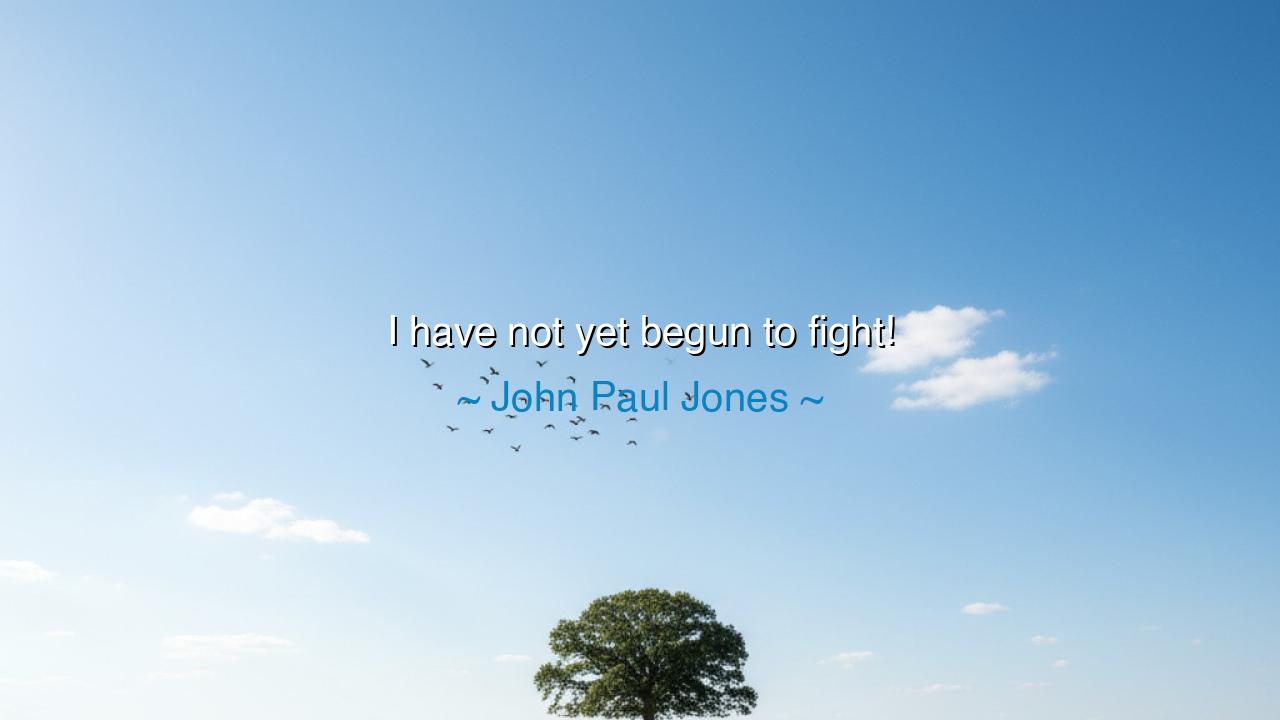
I have not yet begun to fight!






Hear, O children of the free spirit, the thunderous cry of John Paul Jones, father of the American Navy, who in the midst of fire and ruin declared: “I have not yet begun to fight!” These words, uttered in the smoke of battle, are more than defiance—they are the very embodiment of perseverance, the flame of courage that refuses to be extinguished even when all seems lost. In them lies the immortal lesson: that the true warrior is not measured by his wounds or the weight of his foes, but by the unbroken will that rises again and again until victory is seized.
The origin of this cry is set in the year 1779, upon the cold waters of the North Sea. John Paul Jones commanded the Bonhomme Richard, a vessel old and weary, when he engaged the British warship HMS Serapis, far stronger, with guns of greater power. The battle raged fiercely, cannon tearing hulls, muskets cracking, the sea itself shuddering with thunder. His ship caught fire, his men lay dying, and the British captain, certain of victory, called out to ask if Jones would surrender. It was then that Jones, standing amid ruin, gave his immortal answer: “I have not yet begun to fight!”
Though the Bonhomme Richard was sinking, Jones lashed his ship to the Serapis, turning retreat into impossibility. His men fought hand to hand upon burning decks, clashing with sword, musket, and flame. Against all odds, the British crew, astonished by the ferocity of the Americans, surrendered. Jones himself, battered but unyielding, took command of the enemy vessel as his own ship slipped beneath the waves. Thus, the man who seemed on the edge of defeat rose in triumph, and his words became eternal, echoing across the generations.
The ancients, too, knew this spirit. Did not Leonidas and his three hundred at Thermopylae stand defiant though outnumbered, proclaiming that courage, not numbers, decides the honor of men? Did not the defenders of Masada choose death over submission to tyranny? The cry of Jones belongs to this same lineage: the refusal to yield, the fire that transforms despair into victory. For the spirit that will not break is stronger than any iron or flame.
Yet let us not mistake his words as belonging only to the battlefield. They speak to every trial of human life. When hardship presses us down, when voices of doubt surround us, we may be tempted to yield. But Jones teaches us that the true fight begins not in ease, but in adversity. The battle is not lost when the storm rages; it is lost only when the heart ceases to resist. In every trial—whether in work, in family, in the silent wars of the soul—we may declare, “I have not yet begun to fight!” and summon the strength to endure.
What lesson, then, must we take? That perseverance is the soul of victory. Circumstances may be dire, enemies overwhelming, but the one who refuses surrender already holds within himself the seed of triumph. The world may see ruin; the steadfast heart sees only unfinished struggle. This is the wisdom Jones bequeaths to us: that the battle is not decided by appearances, but by endurance.
Practical action lies before us: when we meet obstacles, let us not surrender at the first wound. When the path seems blocked, let us lash ourselves to our purpose as Jones lashed his ship to the Serapis, refusing retreat. Let us cultivate resilience in daily life, building habits of endurance, courage, and faith, so that when great trials arise, we too may cry, not in despair but in defiance: “I have not yet begun to fight!”
So let these words ring like a trumpet through the ages. Remember John Paul Jones upon the burning sea, who, in the hour of seeming defeat, spoke the language of immortality. Carry this cry into your own battles, and teach it to your children, that they may know: surrender is not destiny, and even in the darkest hour, the fight may just be beginning.






HNNguyen Hoang Nam
John Paul Jones' quote is iconic, showing a fiery spirit and resilience. It’s a reminder that sometimes, the fight isn't over until you've given everything. But does this mentality always serve us well, or could it sometimes blind us to reality? When does relentless perseverance turn into futile resistance? Should we, as individuals or societies, always persist in the face of challenge, or should there be moments when we choose a different path?
THha thi hieu
The defiance in John Paul Jones’ words is palpable. It speaks to the spirit of never surrendering, no matter how dire the situation seems. But at what cost does this refusal to give up come? In some situations, this attitude can lead to victory, but in others, it might cause unnecessary suffering. How do we navigate the fine line between fighting for what’s right and stubbornly pursuing a losing cause?
NTNguyen Nhat Trung
This quote brings to mind the value of persistence and not backing down in the face of adversity. But I can’t help but wonder—how many people, throughout history, have said similar words and pushed forward without considering the cost? Is there a limit to the strength of perseverance, or should we always dig in our heels? How can we balance determination with wisdom in the midst of a struggle?
TAThu Nguyen thi anh
John Paul Jones’ quote is a powerful declaration of determination and resilience. It shows a refusal to give up, even when the odds seem stacked against him. But does this unwavering resolve always work in the real world? Is there a point where continuing to fight becomes futile, or is this kind of mindset exactly what is needed to overcome overwhelming obstacles? How do we know when to keep fighting and when to walk away?